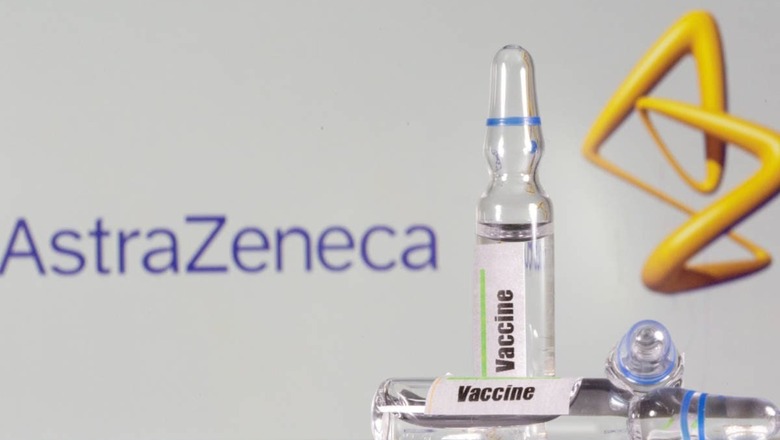
views
The United Kingdom’s medicines regulator approved the Oxford University/AstraZeneca Covid-19 vaccine on Wednesday, paving the way for its rollout in the UK. The development is a shot in the arm for Covishield, the vaccine developed by Serum Institute of India, using a master seed from the Oxford University and AstraZeneca shot.
Here are nine things you need to know about the vaccine:
Who has developed the vaccine?
The vaccine has been developed by a team at The Jenner Institute, University of Oxford, in commercial partnership with British-Swedish company AstraZeneca. On April 30, the University of Oxford and AstraZeneca announced an agreement for the global development and distribution of the university’s vaccine candidate.
What platform/technology has been used to make the vaccine?
The Oxford vaccine is called ChAdOx1 nCoV-19 and it is made from a weakened version of a common cold virus (adenovirus), which causes infections in chimpanzees, and it that has been genetically changed so that it is impossible for it to replicate in humans, the University of Oxford had said.
The vaccine type is known as a viral vector type since it uses a harmless virus as a carrier to deliver the genetic material of a pathogen into cells to create an immune response. In the pre-clinical trials done on monkeys, the vaccine was effective in stopping the Coronavirus infection from progressing to pneumonia. The vaccine protected the monkeys from pneumonia and other serious symptoms but it did not kill the virus.
When and where are the clinical trials happening?
Human clinical trials of the vaccine began in April. In Phase I, 1077 participants were enrolled in England. Recruitment for Phase II trial began in May and 10,260 people were enrolled for these trials. The crucial Phase III trials to test the vaccine’s efficacy are going on in the UK, Brazil, South Africa, Kenya, and the USA and in India through the Serum Institute of India. Thousands have participated in each of these Phase III trials.
What did the clinical trials show?
Peer reviewed studies of the clinical trial data showed that the vaccine showed an average efficacy of 70.4 per cent over two different dosing regimens. The vaccine efficacy data was based on 11,636 volunteers across the United Kingdom and Brazil.
AstraZeneca’s late-stage trials showed 62 per cent for participants given two full doses several weeks apart – above the 50 per cent usually considered adequate by regulators – but 90% for a smaller sub-group of 2,741 people given a half dose and then a full dose. Thus, the combined analysis resulted in an average efficacy of 70 per cent, the University had said earlier this month.
AstraZeneca did not specify which dose regime had been approved, but researchers said approval was the most important thing.
What are the vaccine’s storage requirements?
Among the vaccine frontrunners, the Oxford/AstraZeneca vaccine’s cold storage requirements are normal. The shot requires refrigeration at 2-8 degree Celsius levels and is easy to transport. This has made the vaccine the most sought after in developing nations which do not have a vast network of advanced cold storage. In contrast, Moderna’s vaccine requires storage at -20 degree Celsius and Pfizer-BioNTech’s vaccine requires -70 degree Celsius storage. Adequate storage is imperative for a mass vaccination programme as warmer than prescribed storage temperature renders the vaccines to be ineffective.
How many people has the vaccine been tested on?
SII and ICMR finished enrolment for Phase-III Covishield vaccine that was developed at Pune with a master seed from Oxford-AstraZenenca last month. ICMR is funding the clinical trial site fees. SII has already manufactured 40 million doses of the vaccine, under the at-risk manufacturing and stockpiling license from DCGI, ICMR, the company announced last month. Covishield’s Phase-III trials involves 1,600 participants as per Clinical Trial Registry – India.
What does this mean for vaccine rollout in India?
The UK regulator’s approval is a massive shot in the arm for the approval prospects of Serum Institute of India’s Covishield vaccine since it is essentially made with the same technology. The approval could come as early as today.
What has India’s regulator said about the Serum Institute’s vaccine so far?
The Subject Expert Committee under the Drugs Controller General of India had held a review meeting earlier this month to appraise data on Covishield’s efficacy and trials. The company submitted interim safety data from Phase II/III clinical trials carried out in the country and from Phase III trials carried out in the UK.
The expert committee had sought more information from the company relating to immunogenicity data from clinical trials in the UK and India. It had also sought details of the UK regulator’s assessment of the vaccine.
What were the side effects and adverse effects caused by the vaccine?
As per a study published in Lancet, adverse events were reported. However, only three were possibly related to the vaccine. This included a case of transverse myelitis, which causes inflammation of the spinal cord, occurring 14 days after booster dose was administered.
In India, a Chennai-based participant of Serum’s trials filed sought Rs.5 crore compensation from the company as well as Oxford/AstraZeneca due on grounds of an alleged seriously adverse event after getting the vaccine. According to the legal notice of the Chennai-based volunteer, he suffered from Acute Neuro Encephalopathy and was admitted from October 12 to October 26. SII has refuted the allegations and said that that it will seek damages in excess of Rs.100 crore.
Read all the Latest News, Breaking News and Coronavirus News here




















Comments
0 comment